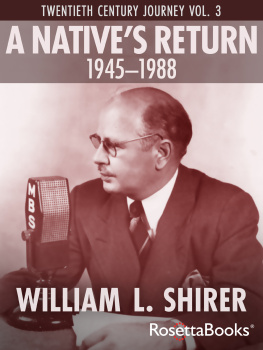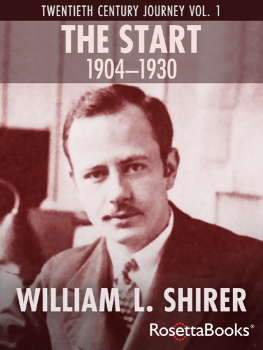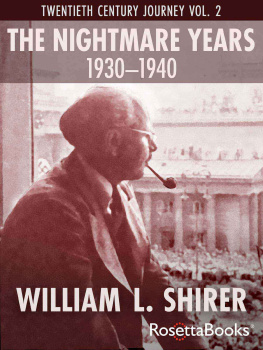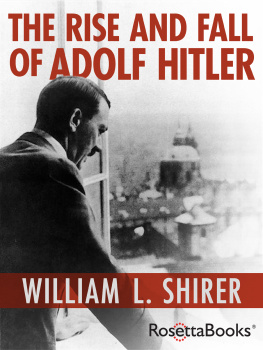A Natives Return, 19451988
Twentieth Century Journey Vol. III
William L. Shirer
Copyright
A Natives Return, 19451988
Copyright 1990, 2014 by William L. Shirer
Cover art, special contents, and Electronic Edition 2014 by RosettaBooks LLC
All rights reserved. No part of this book may be used or reproduced in any form or by any electronic or mechanical means, including information storage and retrieval systems, without permission in writing from the publisher, except by a reviewer who may quote brief passages in a review.
Cover jacket design by Alexia Garaventa
ISBN e-Pub edition: 9780795334177
This last volume of memoirs is for
Irina Alexandrovna Lugovskaya
who came from another world.
History, with its flickering lamp, stumbles along the trail of the past, trying to reconstruct its scenes, to revive its echoes, and kindle with pale flames the passions of former days.
W INSTON C HURCHILL
Whats important is not fame, nor glory, but the ability to endure, to be able to bear ones cross and have faith.
A NTON C HEKHOV
The mystery and the immensity of human existence.
R ADHAKRISHNAN
Life, as it is imposed on us, is too hard; it brings us too many pains, disappointments, insoluable tasks. The intention that man should be happy is not contained in the plan of Creation.
S IGMUND F REUD
No beast is more savage than man, when possessed with power answerable to his rage.
P LUTARCH
A culture which disavowed the tragic sense of life does not find it easy to deal with lifes deeper complexities without despair.
R EINHOLD N IEBUHR
Life must move forward, but it can only be understood backward.
S REN K IERKEGAARD
The universe was always insecure.
H ERBERT B UTTERFIELD
Preface
This is the third and last volume recounting one mans journey through the twentieth century, a time that saw more changes on the planet than in the previous nineteen hundred years.
It saw more violence too, more bloodshed, bigger, more devastating wars.
There were, to be sure, periods of peace and growing prosperity for many, especially in the U.S.A. Science and invention exploded, utterly transforming the way we lived and altering our conception of our origins and our place in the universe. Youngsters today say they simply cannot imagine what life was like, say, back in 1904 when I was born, when people got about in horse and buggies, before the automobile, the telephone, electric lighting and power, and central heating came into general use; before there were airplanes, movies, radio and television, oil burners, electric refrigerators, air conditioners, gasoline-driven tractors, paved roads, garages, filling-stations, traffic lights, parking lots, shopping centers, airports, income taxes, social welfare, womens suffrage, computers, VCRs, jet engines, radar, moon landings, napalm bombs, nuclear bombs, space rockets, spaceships, space stations, lasers, and much else that has become commonplace today.
My father, who had a college and law-school education, and was a liberal, tolerant mannot an old fogey at all and only forty-two when he diedthought motor cars, of which there were only a few thousand in the whole land, were a menace and should be barred from the city streets and the country roads because they endangered pedestrians and frightened horses.
He also took a dim view of airplanes, of which there were only a handfulall tiny biplanesin the whole country. The idea of travel by air, especially across continents and oceans at close to the speed of sound or beyond it, he would have dismissed as a pipe dream.
If God had intended us to fly, he told me after we saw our first planes in a primitive demonstration of a dozen sputtering little biplanes over Grant Park in Chicago on September 27, 1910, He would have given us wings. Lets leave flying to the birds.
Whether all these ingenious mechanical inventions and their fantastic development during the twentieth century have improved the quality of life and given it more depth and meaning, I doubt. They have certainly liberated menand especially womenfrom much drudgery, opened horizons not dreamed of at the turn of the century, and speeded up living to such a frantic pace that I often want to get off the merry-go-round and catch my breath and regain my senses.
All these developments have also improved the standard of living of most people immensely, though tens of millions on earth still hunger and remain homeless, a sizable and disgraceful number in the affluent U.S.A. Most of us, at least in the West, are much better off materially than when I was born, but are we better educated, happier, wiser?
For most of the first twenty years of my adult life I worked abroad, and the previous two volumes of these memoirs have dealt largely with the world beyond our shores, principally Europe.
This book has to do with a coming home and what, after so long an absence, it was like to live and work in America during the nearly half a century since the end of the Second World War.
Luck, or fate, or God, or whatever it is that determines the extent of our lives, allowed me to live through most of this tumultuous twentieth century and through a sizable chunk of our countrys existence.
In fact, as James Reston reminded me recently, our work as reporters and commentators on our times, stretching as it has over a half century or more, has covered one-fourth of the life of the Republic, in my own case sixty-four of its two hundred years.
For me it has been a long journey, full of ups and downs as with most lives, but wonderful and exciting and perplexing and troubling almost all the way.
General Introduction
The writing of memoirs, I find, is a strange and tricky business.
Can you tell the truth? Does memory, blurred and disjointed by the passage of time and fed by the imagination, lead you to recount more fiction than fact? William Allen White was afraid it did. This Autobiography, he warned in the preface to his memoirs, in spite of all the pains I have taken and the research I have put into it, is necessarily fiction. The reader, he said, should not confuse this story with reality. For God only knows the truth. White was merely trying, he concluded, to set down some facts which seem real and true to me.
That is all I have attempted to do in this memoir of a life and the times. I, too, have done years of research in a considerable pile of personal papers, though some were lost in the war and in travel, for a foreign correspondent led a nomadic life, living out of a suitcase. And I have been haunted and humbled by the warnings of poets, philosophers, and memorialists whose abilities and attainments were far above mine. Montaigne thought man was simply incapable of attaining truth because he was the servant of customs, prejudices, self-interest and fanaticism. The bane of man is the illusion that he has the certainty of his knowledge.
Isadora Duncan, who lived such a full and tragic life, used to talk to me about her memoirs while she was writing them in Paris. How can we write the truth about ourselves? she would ask. Do we even know it? Emily Dickinson thought that truth is so rare, its delightful to tell it. Delightful maybe, but difficult.
What is truth? To Santayana truth is a dream unless my dream is true. And Andr Malraux, in writing his memoirsor anti-memoirs, as he called themspeculated that the truth about a man is first of all what he hides, but he differentiated between what a man hides and what he ignores in himself. The two are not the same. Stendhal wrote one book after another about himself in an effort to understand who and what he was, but the search for the truth eluded him. What manner of man am I? he finally asked, and admitted: In truth, I havent the faintest idea.










